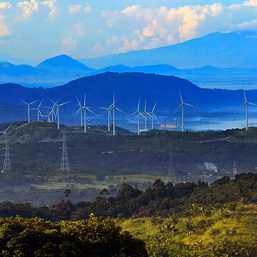SUMMARY
This is AI generated summarization, which may have errors. For context, always refer to the full article.

MANILA, Philippines – The administration of President Ferdinand Marcos Jr. is eyeing to make the mining industry one of the key drivers of the economy. To do this, Marcos declared as priority the rationalization of the mining fiscal regime.
Aligned with the President’s priorities, the House of Representatives approved House Bill 8937 or the Act Enhancing the Fiscal Regime for the Mining Industry on early Tuesday morning, September 26, after a series of long budget deliberations for government agencies the previous day.
The bill seeks to impose a 4% royalty on the gross output of mining operations within mining reservations – a decline from the current 5%.
Mining reservation areas are sites that the government had identified as economically viable and mineral rich. There are currently nine mining reservation areas in the Philippines.
Despite its speedy passage, the bill was critiqued for supposedly cutting down taxes for mining companies.
“Akala ko ba the concern of the government was to raise revenue?” Cielo Magno, an economics professor at the University of the Philippines Diliman and a former undersecretary in the Department of Finance, told Rappler in an interview.
(I thought the concern of the government was to raise revenue?)
“Why are we lowering taxes for these companies when they’re already paying 5%?”
Aside from revenue concerns, the mining fiscal regime bill is being proposed in the face of a growing demand for more minerals to supply the needs of countries transitioning to clean technologies.
After the bill hurdled the House, Speaker Martin Romualdez said in a statement that he agrees with the Chamber of Mines that the proposed fiscal regime would help the country in its post-pandemic recovery.
“Though the bill, the mining industry proves itself as a key partner of the government in nation-building,” said Romualdez, whose family has interests in mining.
What are the reforms in the bill?
It would take a while before the reforms get enacted as the Senate still has to come up with its version of the bill.
At present, the government gets 5% royalty from the gross output of companies operating in mining reservations. Those within ancestral domains give 1% of their gross output to the government. Those outside mineral reservation areas do not pay royalties.
What reforms are being proposed to make the industry a key player in the economy? Here are the salient features of HB 8937:
- Lowers royalty rate of mining operations within mining reservations from 5% to 4%
- Imposes profit-based royalty for mining operations outside mining reservations; the current fiscal regime does not levy taxes for operations outside mining reservations
- Subjects companies to a windfall profits tax
- Subjects small-scale mining operations with royalty rate equivalent to one-tenth of 1% of gross minerals output
- Does not impose export tax

With a margin of 1% to 10%, a mining company operating outside a mineral reservation will pay 1% royalty. At best, the government would get 5% royalty from a company that has a margin of above 70%.

With the windfall profit tax system, the government can start taking taxes from companies only after they make at least a 35%-40% margin.
The royalty to be imposed on operations outside mineral reservations seems to be a welcome development.
Back in 2018, the Commission on Audit released a report saying the government lost at least P2.67 billion from 2012 to 2016 because a 5% royalty was not levied on five mining companies operating outside mineral reservation areas in Caraga.
However, some view the profit-based system as problematic because even when companies are not making considerable profits in their operations, their activities still impose risks and irreversible damage on the environment.
“Basing royalties on profit margins will be unfair,” said policy group Action for Economic Reforms (AER) in a statement. “This will protect mining companies’ profits but will leave local communities exposed and uncompensated to the impact and risks of mining.”
AER argued that tax based on profit is tax that will be easy to avoid, given the industry’s asymmetry.
“Information asymmetry is a persistent feature of the mining industry,” the group said. “Margin-based taxation will give mining companies greater incentive and more opportunities to obscure their financial data, leading to potential tax evasion or avoidance.”
Is the proposed fiscal regime responsive to climate agenda?
The trend of transitioning to renewable energy is increasing the demand for more minerals. And nowadays, the question of sustainability follows many economic reforms.
Magno explained the situation using the basic supply and demand framework.
“The demand for minerals is much higher now. Therefore, we would expect the demand for mining would be very high. Prices would be increasing,” the economics professor said.
According to the International Energy Agency (IEA), the world is on track to doubling its mineral requirements by 2040 to meet the demands of clean energy transition.
Fast tracking transition by 2050 would demand a sixfold increase in mineral inputs in 2040, IEA reported.
“If that’s the direction of the industry, why are we lowering our taxes? We should be getting the bigger share from that,” Magno said.
The Philippines is one of the top producers of nickel in the world, a necessary mineral in the creation of low carbon technologies. Nickel is used in electric vehicle batteries, geothermal and solar technologies.
In a speech delivered during the Nickel Initiative 2023 Business Conference, Dante Bravo, the president of the Philippine Nickel Industry Association (PNIA), said policy instability and conflicts between the national and local governments hinder ease of doing business.
Bravo said that they are grateful with the government’s openness to dialogue, having met with concerned officials “several times.”
“Through our joint efforts and continued consultations, PNIA [looks] forward to seeing a more stable fiscal regime, an alignment of national and local policies…and hopefully, a one-stop shop for the industry,” said Bravo.
What does this mean for host communities?
Many mining sites across the Philippines are contested by pockets of communities that bemoan the lack of consultations, permits, and consent from indigenous peoples.
Transparency and accountability – the hallmarks of good governance – in mining activities should be reflected on the fiscal regime, according to Magno.
This includes respecting the rights of the communities, improving the capacity of the government to regulate businesses, and properly validating the value of minerals.
“A lot of information is not accessible for communities to make an objective decision whether mining is good for them or not,” said Magno.
“We have to recognize that they are essential in the mining operations and should therefore be part of the decision-making process.
Because of royalties in the bill, host communities will get lower shares.
At present, local governments get 40% of the gross collection of the national government from mining taxes, royalties, forestry and fishery charges, and other fees related to the extraction of national wealth.
A reduction in taxes, and consequently in the share of communities, could affect their ability to mitigate damage and risks poised by mining operations.
Maya Quirino, the advocacy coordinator of policy think tank Legal Rights and Natural Resources Center, said that through various consultations with host communities, they have learned that the share of indigenous peoples and local governments remain low. She said they had hoped the fiscal regime bill would address this.
“We are batting for a 10% royalty for indigenous people who agree to mining projects in their ancestral domains, and an additional 10% share from excise taxes to local governments where mining projects can be found,” Quirino told Rappler.
According to the Mining Act, royalty payments to indigenous peoples “upon utilization of the minerals shall be agreed upon by the parties.”
One of the reforms under the bill is a creation of a mechanism that would compel mining firms to disclose all mining-related data, including tax and revenue data.
Mining firms will also be exempted from the application of confidentiality clauses of the National Internal Revenue Code. – Rappler.com
Add a comment
How does this make you feel?







![[Just Saying] SONA 2024: Some disturbing points](https://www.rappler.com/tachyon/2024/07/TL-marcos-sona-points-july-23-2024.jpg?resize=257%2C257&crop=335px%2C0px%2C720px%2C720px)






![[EDITORIAL] Apat na taon na lang Ginoong Marcos, ‘di na puwede ang papetiks-petiks](https://www.rappler.com/tachyon/2024/07/animated-bongbong-marcos-2024-sona-day-carousel.jpg?resize=257%2C257&crop=280px%2C0px%2C720px%2C720px)
![[In This Economy] Delulunomics: Kailan magiging upper-middle income country ang Pilipinas?](https://www.rappler.com/tachyon/2024/07/in-this-economy-upper-middle-income-country.jpg?resize=257%2C257&crop=421px%2C0px%2C1080px%2C1080px)

![[EDITORIAL] Marcos Year 2: Hilong-talilong](https://www.rappler.com/tachyon/2024/07/animated-bongbong-marcos-2nd-sona-carousel.jpg?resize=257%2C257&crop=136px%2C0px%2C720px%2C720px)
![[Newspoint] A fighting presence](https://www.rappler.com/tachyon/2024/07/thought-leaders-a-fighting-presence.jpg?resize=257%2C257&crop=441px%2C0px%2C1080px%2C1080px)
There are no comments yet. Add your comment to start the conversation.